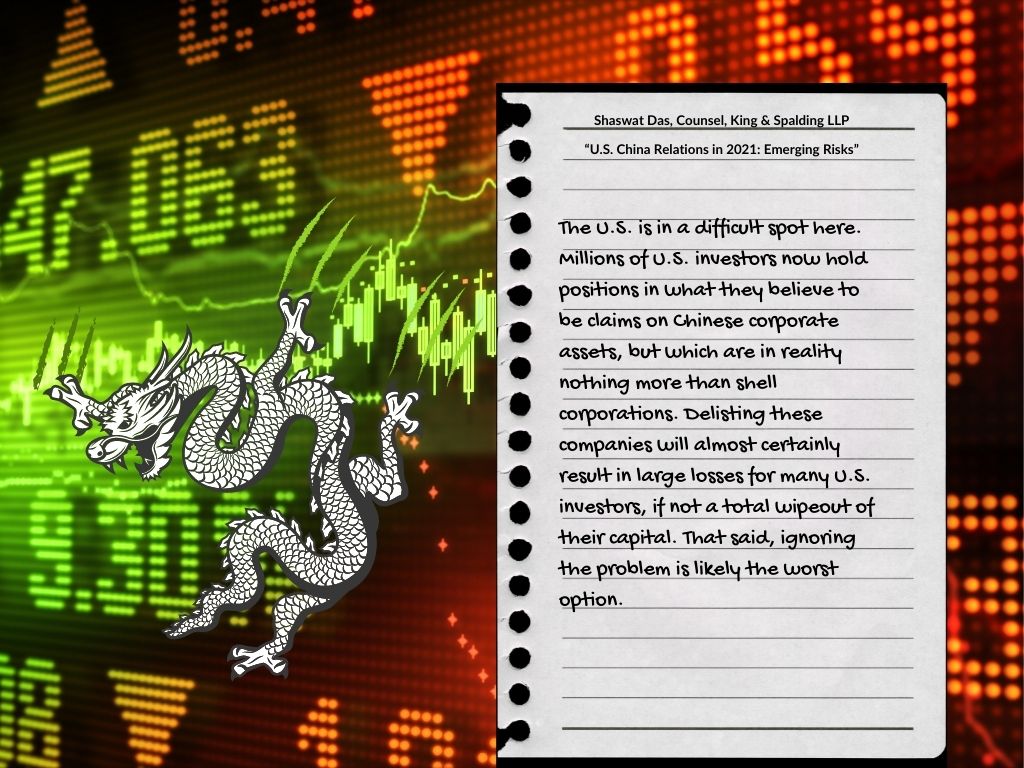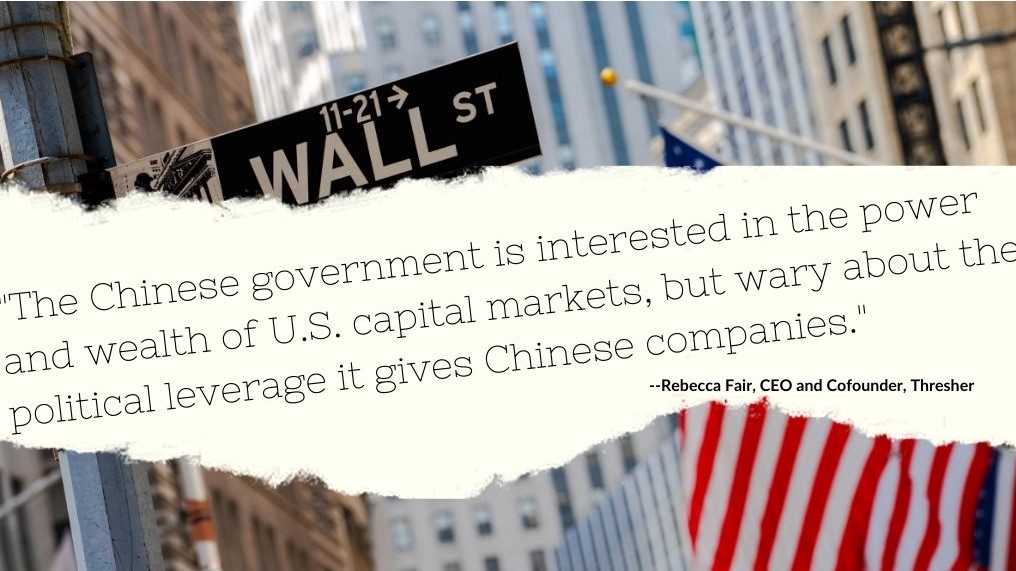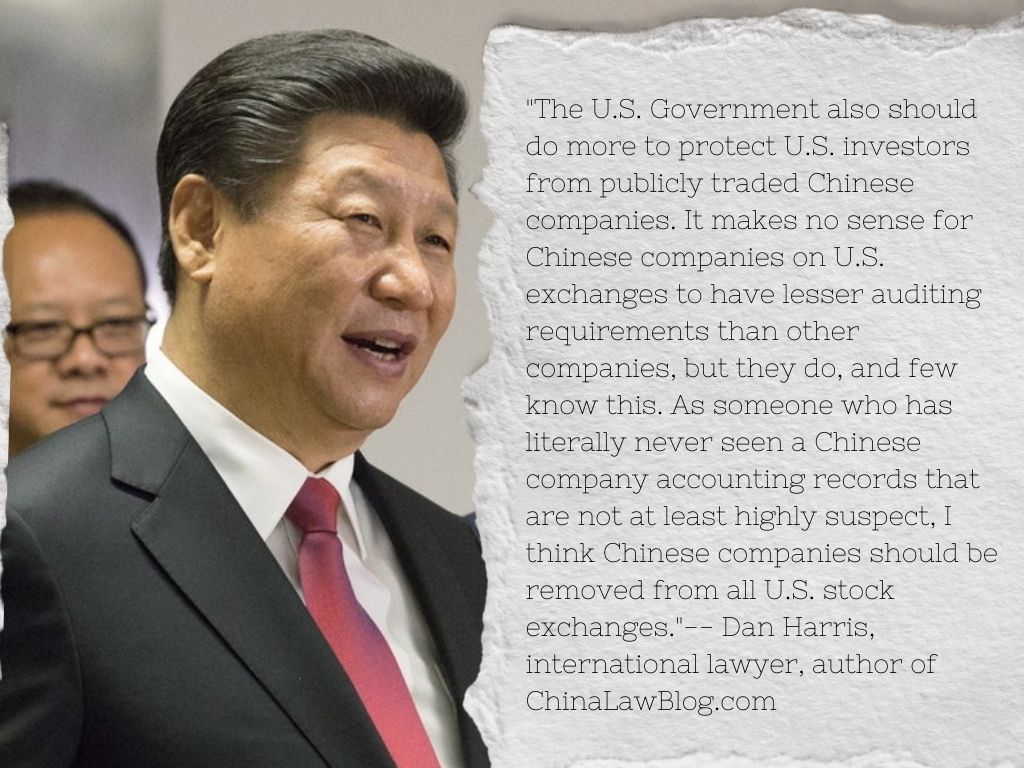The China-U.S. relationship looks a lot like a one-way street. But while China has benefited most, so have American multinationals that thrived on labor and regulatory arbitrage, and – more recently – Wall Street, which now has unfettered access to the mainland China securities market. Good luck finding a China stock that doesn’t have millions invested in it by Vanguard and BlackRock.
Still, the one-way nature of the relationship often has China at an advantage. Those advantages are slipping away, partly due to pressure from Washington and partly due to Beijing sensing they’re no longer loved like they used to be. The romance is on the rocks. There are only a few hangers-on on Wall Street, at this point. (See BlackRock’s recent spat with George Soros of China investment, for example.)
 Recent, first-ever, capital markets sanctions against dozens of Chinese publicly traded companies are the best example of that split. China has used the NYSE and Nasdaq listings as a way to raise capital for its companies, all the while ignoring financial auditing rules requested of them for years now by the Public Company Accounting Oversight Board (PCAOB), an entity that was created out of the Sarbanes-Oxley Act (SOX) of 2002. Other foreign-run companies listed here abide by the rules set forth in that Act.
Recent, first-ever, capital markets sanctions against dozens of Chinese publicly traded companies are the best example of that split. China has used the NYSE and Nasdaq listings as a way to raise capital for its companies, all the while ignoring financial auditing rules requested of them for years now by the Public Company Accounting Oversight Board (PCAOB), an entity that was created out of the Sarbanes-Oxley Act (SOX) of 2002. Other foreign-run companies listed here abide by the rules set forth in that Act.
CPA believes the curtain is closing on this special treatment for China.
In a hearing on Wednesday by the U.S. China Economic and Security Review Commission, booting China from Wall Street was so important for the Commission that a separate panel was called upon to discuss it.
CPA believes the Commission will ultimately advocate for more delisting of Chinese stocks from the U.S. exchanges and other sanctions on certain Chinese companies. While reports from the Commission do not carry any force, their recommendations are taken seriously by lawmakers and executive branch regulators.
China has long viewed U.S. capital markets as an easy source of funds. But in light of the increased scrutiny of Chinese companies listed here, the most likely course of events is for Beijing to somehow force their companies to list on Shenzhen’s ChiNext, Shanghai’s STAR Market, or in Hong Kong, where they can earn Hong Kong dollars.
Chinese IPOs have flourished in the United States for years, some as offshore Variable Interest Entities (VIE), which are basically shell companies. Investors here would be invested in a VIE which is invested in the actual money-making entity in China. VIEs are a classic example of how the CCP operates. China has allowed VIEs for at least a decade to bring in foreign capital. But it has never formally legalized them and now that the CCP is making clear in various ways it no longer values them as much, as political winds are changing in Washington, Wall Street is worried.
China’s leaders now appear willing to sacrifice the capital they rake in from U.S. listings if doing so will protect the Chinese Communist Party and their views.
One of those mainline views has always been that the CCP does not allow for third-party financial audits of its state-owned companies it claims because of state secrets, but often is more to maintain state control. They were granted special privileges in the Obama years, to avoid compliance. It’s not just state companies, however. Some private companies also do not comply, which begs the question: who is the real power behind the throne at these Chinese companies?
TikTok parent ByteDance is not publicly traded, but a political member of the CCP has one of the three seats on its board.
“U.S. inspections of its companies’ audits are likely to be unsuccessful,” said Shaswat Das, a legal counsel for international trade at King & Spalding. “I fought hard to reach an agreement whereby China-based audit firms registered with the PCAOB would comply with U.S. inspections during my time at the PCAOB.” His mission would prove unsuccessful.
Das spoke at this week’s Commission hearing titled “U.S.-China Relations in 2021: Emerging Risks”. You can read his opening testimony here.
China is now moving beyond the insider baseball banter of SOX audits. They’re spinning the increased scrutiny in different ways now.
 The Chinese government has pushed the narrative in the Chinese press and on social media platforms that tech companies listed on the NYSE are national security liabilities for them because Washington and any U.S.-based investor can get access to a Chinese companies’ data. The only real data, of course, is financial data, but China doesn’t single that out, preferring to make it appear to the average Chinese person with a WeChat account that their privacy rights are being compromised (as if Chinese people have any privacy rights).
The Chinese government has pushed the narrative in the Chinese press and on social media platforms that tech companies listed on the NYSE are national security liabilities for them because Washington and any U.S.-based investor can get access to a Chinese companies’ data. The only real data, of course, is financial data, but China doesn’t single that out, preferring to make it appear to the average Chinese person with a WeChat account that their privacy rights are being compromised (as if Chinese people have any privacy rights).
The Chinese government – being the dictatorship that it is – has been going after A-list companies like Alibaba and even its famous founder, Jack Ma, for not complying with Beijing’s rules and is now going after newly listed firms, like Didi, which IPO’d here this summer,
There’s always something going on that American investors in these companies, small and large, are not privy to. It also might be safe to say that the Chinese companies themselves are not clued in, either. The real CEO of China Inc., after all, is Chairman Xi. This alone should scare Wall Street, but it does not to any major extent just yet. It increasingly worries Washington, however, as Wednesday’s hearing clearly shows.
“China seeks to control the players in its economy. As part of this effort, the Chinese government is increasingly trying to control Chinese companies’ involvement in the U.S. market and to retaliate against U.S. companies in China’s markets,” said Rebecca Fair, CEO and Founder of a cybersecurity company called Thresher. She was one of three who testified before the Commission on Wednesday. Fair’s opening statements can be found here.
She explained new ways that China is waging its war against Washington’s insistence on China playing by the same rules as Brazil when it comes to U.S. listings. “A key component of controlling the players is controlling information about the players. China spends billions annually to control its information environment, deploying AI and humans to generate and moderate huge volumes of content,” she said, most of it online in chat rooms and on American social media platforms like Twitter. “Beijing uses this information control machine to attempt to shape the conversation about the Chinese economy as well as Chinese companies in the China and U.S. markets. Distorting economic and financial information makes it difficult for the U.S. government and U.S. to make good decisions because good decision making relies on good data.”
Dan Harris, an international lawyer with Harris Bricken, summed up the only possible response to all of this: “I think Chinese companies should be removed from all U.S. stock exchanges,” he said in his opening remarks. “But if they are to be allowed, they should at least be required to meet the same standards as other companies and the SEC should alert investors to their special risks.” Harris added that “as someone who has seen many Chinese financial statements, I can’t think of a single time when I didn’t find one that was highly suspect.”
 Oddly enough, when it comes to more capital markets sanctions against Chinese companies, the CCP may be looking to move on, and derisk.
Oddly enough, when it comes to more capital markets sanctions against Chinese companies, the CCP may be looking to move on, and derisk.
Das thinks Xi Jinping is reading the tea leaves just fine. He sees the Biden Administration continuing where the Trump Administration left off: going ahead with imposing divestment and delisting of Chinese stocks.
“It seems likely that President Xi would want to be seen as proactively calling companies home rather than having them kicked off exchanges by U.S. regulators. But that narrative is for Chinese citizens,” he said. “We can easily imagine a parallel narrative for U.S. investors where the Chinese government blames, in its view, overzealous U.S. politicians and regulators instead.”
CPA’s stance is that the longer U.S. capital is allowed to freely flow into poorly regulated, “black box” Chinese operations, either on the mainland or through VIEs, the more they are allowing unacceptable systemic risk into the U.S. financial system.
In Latest Hearings, More Arguments Made to Boot China from Wall Street
The China-U.S. relationship looks a lot like a one-way street. But while China has benefited most, so have American multinationals that thrived on labor and regulatory arbitrage, and – more recently – Wall Street, which now has unfettered access to the mainland China securities market. Good luck finding a China stock that doesn’t have millions invested in it by Vanguard and BlackRock.
Still, the one-way nature of the relationship often has China at an advantage. Those advantages are slipping away, partly due to pressure from Washington and partly due to Beijing sensing they’re no longer loved like they used to be. The romance is on the rocks. There are only a few hangers-on on Wall Street, at this point. (See BlackRock’s recent spat with George Soros of China investment, for example.)
CPA believes the curtain is closing on this special treatment for China.
In a hearing on Wednesday by the U.S. China Economic and Security Review Commission, booting China from Wall Street was so important for the Commission that a separate panel was called upon to discuss it.
China has long viewed U.S. capital markets as an easy source of funds. But in light of the increased scrutiny of Chinese companies listed here, the most likely course of events is for Beijing to somehow force their companies to list on Shenzhen’s ChiNext, Shanghai’s STAR Market, or in Hong Kong, where they can earn Hong Kong dollars.
Chinese IPOs have flourished in the United States for years, some as offshore Variable Interest Entities (VIE), which are basically shell companies. Investors here would be invested in a VIE which is invested in the actual money-making entity in China. VIEs are a classic example of how the CCP operates. China has allowed VIEs for at least a decade to bring in foreign capital. But it has never formally legalized them and now that the CCP is making clear in various ways it no longer values them as much, as political winds are changing in Washington, Wall Street is worried.
China’s leaders now appear willing to sacrifice the capital they rake in from U.S. listings if doing so will protect the Chinese Communist Party and their views.
One of those mainline views has always been that the CCP does not allow for third-party financial audits of its state-owned companies it claims because of state secrets, but often is more to maintain state control. They were granted special privileges in the Obama years, to avoid compliance. It’s not just state companies, however. Some private companies also do not comply, which begs the question: who is the real power behind the throne at these Chinese companies?
TikTok parent ByteDance is not publicly traded, but a political member of the CCP has one of the three seats on its board.
“U.S. inspections of its companies’ audits are likely to be unsuccessful,” said Shaswat Das, a legal counsel for international trade at King & Spalding. “I fought hard to reach an agreement whereby China-based audit firms registered with the PCAOB would comply with U.S. inspections during my time at the PCAOB.” His mission would prove unsuccessful.
Das spoke at this week’s Commission hearing titled “U.S.-China Relations in 2021: Emerging Risks”. You can read his opening testimony here.
China is now moving beyond the insider baseball banter of SOX audits. They’re spinning the increased scrutiny in different ways now.
The Chinese government – being the dictatorship that it is – has been going after A-list companies like Alibaba and even its famous founder, Jack Ma, for not complying with Beijing’s rules and is now going after newly listed firms, like Didi, which IPO’d here this summer,
“China seeks to control the players in its economy. As part of this effort, the Chinese government is increasingly trying to control Chinese companies’ involvement in the U.S. market and to retaliate against U.S. companies in China’s markets,” said Rebecca Fair, CEO and Founder of a cybersecurity company called Thresher. She was one of three who testified before the Commission on Wednesday. Fair’s opening statements can be found here.
She explained new ways that China is waging its war against Washington’s insistence on China playing by the same rules as Brazil when it comes to U.S. listings. “A key component of controlling the players is controlling information about the players. China spends billions annually to control its information environment, deploying AI and humans to generate and moderate huge volumes of content,” she said, most of it online in chat rooms and on American social media platforms like Twitter. “Beijing uses this information control machine to attempt to shape the conversation about the Chinese economy as well as Chinese companies in the China and U.S. markets. Distorting economic and financial information makes it difficult for the U.S. government and U.S. to make good decisions because good decision making relies on good data.”
Dan Harris, an international lawyer with Harris Bricken, summed up the only possible response to all of this: “I think Chinese companies should be removed from all U.S. stock exchanges,” he said in his opening remarks. “But if they are to be allowed, they should at least be required to meet the same standards as other companies and the SEC should alert investors to their special risks.” Harris added that “as someone who has seen many Chinese financial statements, I can’t think of a single time when I didn’t find one that was highly suspect.”
Das thinks Xi Jinping is reading the tea leaves just fine. He sees the Biden Administration continuing where the Trump Administration left off: going ahead with imposing divestment and delisting of Chinese stocks.
“It seems likely that President Xi would want to be seen as proactively calling companies home rather than having them kicked off exchanges by U.S. regulators. But that narrative is for Chinese citizens,” he said. “We can easily imagine a parallel narrative for U.S. investors where the Chinese government blames, in its view, overzealous U.S. politicians and regulators instead.”
CPA’s stance is that the longer U.S. capital is allowed to freely flow into poorly regulated, “black box” Chinese operations, either on the mainland or through VIEs, the more they are allowing unacceptable systemic risk into the U.S. financial system.
MADE IN AMERICA.
CPA is the leading national, bipartisan organization exclusively representing domestic producers and workers across many industries and sectors of the U.S. economy.
TRENDING
CPA: Liberty Steel Closures Highlight Urgent Need to Address Mexico’s Violations and Steel Import Surge
CPA Applauds Chairman Jason Smith’s Reappointment to Lead House Ways and Means Committee
Senator Blackburn and Ossoff’s De Minimis Bill is Seriously Flawed
JQI Dips Due to Declining Wages in Several Sectors as November Jobs Total Bounces Back from Low October Level
What Are Trump’s Plans For Solar in the Inflation Reduction Act?
The latest CPA news and updates, delivered every Friday.
WATCH: WE ARE CPA
Get the latest in CPA news, industry analysis, opinion, and updates from Team CPA.
CHECK OUT THE NEWSROOM ➔